Abu Dhabi Islamic Bank Bundle
How Does Abu Dhabi Islamic Bank Navigate Its Competitive Arena?
Abu Dhabi Islamic Bank (ADIB) isn't just another bank; it's a cornerstone of Islamic finance, experiencing remarkable growth. Established in 1997, ADIB has evolved into a major financial player, offering a full suite of Sharia-compliant banking services. Its impressive 2024 financial results, including a record net profit, highlight its strength and strategic positioning in the market.
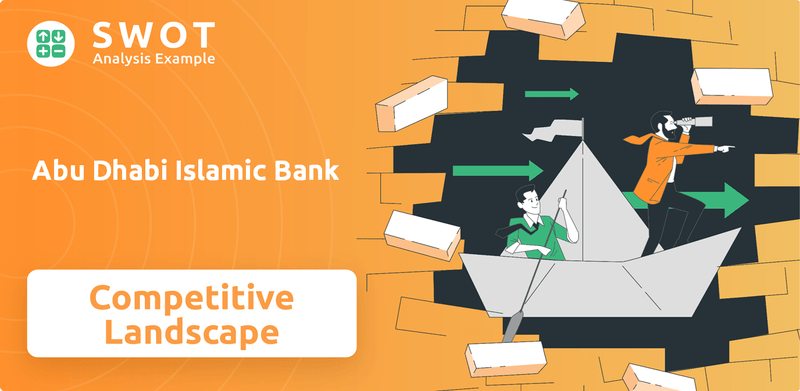
Understanding the Abu Dhabi Islamic Bank SWOT Analysis is crucial to grasping its position within the dynamic ADIB competitive landscape. This analysis will delve into ADIB competitors, exploring their strategies and market share, and providing insights into the Islamic banking in UAE sector. We'll examine how ADIB's financial performance stacks up against rivals, including ADIB vs Emirates Islamic Bank, to offer a comprehensive banking sector analysis and identify ADIB's competitive advantages.
Where Does Abu Dhabi Islamic Bank’ Stand in the Current Market?
The Abu Dhabi Islamic Bank (ADIB) holds a strong market position within the Islamic banking industry, especially in the UAE. It's recognized as a leading Islamic bank in the region and is the 4th largest Islamic bank in the GCC by total assets. ADIB's operations are centered around providing Sharia-compliant financial products and services to retail, corporate, and investment banking clients.
ADIB's core value proposition revolves around offering a comprehensive suite of Islamic banking solutions. This includes accounts, financing options like home and auto finance, investments, and wealth management services. The bank focuses on customer satisfaction and innovation, evident in its digital transformation efforts and the expansion of its customer base.
In 2024, ADIB's total assets reached AED 226 billion, marking a 17% year-on-year increase. This growth reflects the bank's strong performance and its strategic focus on expanding its market share. The bank's financial health is robust, as highlighted by its return on equity (RoE) of 28% in 2024, which is a key indicator of its profitability and efficiency.
ADIB has demonstrated significant growth in key areas. Customer financing increased by 24% year-on-year, adding AED 28 billion in 2024. Customer deposits also saw a substantial rise, increasing by 16% year-on-year to AED 183 billion. This growth indicates ADIB's ability to attract and retain customers in a competitive market.
ADIB expanded its customer base by approximately 216,000 new customers in 2024, reaching a total of around 1.5 million. The bank has also made significant strides in digital transformation. Between 85%-90% of new accounts were opened via mobile and digital channels in 2024, and digital financing doubled to AED 8 billion.
ADIB's financial health is robust, with a return on equity (RoE) of 28% in 2024. The non-performing financing ratio improved to 4.0% in 2024, down from 6.1% in 2023, reaching its lowest level since Q1 2017. This demonstrates the bank's effective risk management and asset quality.
ADIB maintains a healthy liquidity position with an advances to stable funding ratio at 81.0% and an eligible liquid asset ratio of 17.8% as of December 31, 2024. The bank's strong capital position is further evidenced by a Common Equity Tier 1 ratio of 12.1% and a total Capital Adequacy Ratio of 16.2%.
ADIB's competitive advantages include its strong brand reputation, Sharia-compliant product offerings, and focus on digital innovation. The bank's performance is closely tied to the overall health of the Islamic banking market in the UAE and its ability to adapt to changing customer preferences and technological advancements. For more information on the stakeholders, you can read more about the Owners & Shareholders of Abu Dhabi Islamic Bank.
ADIB's strengths include a strong market position, robust financial performance, and a commitment to digital transformation. The bank's focus on customer satisfaction and Sharia-compliant products sets it apart in the competitive landscape.
- Strong market share in the UAE's Islamic banking sector.
- Significant growth in customer financing and deposits.
- High RoE and improved asset quality.
- Advanced digital banking capabilities.
Abu Dhabi Islamic Bank SWOT Analysis
- Complete SWOT Breakdown
- Fully Customizable
- Editable in Excel & Word
- Professional Formatting
- Investor-Ready Format
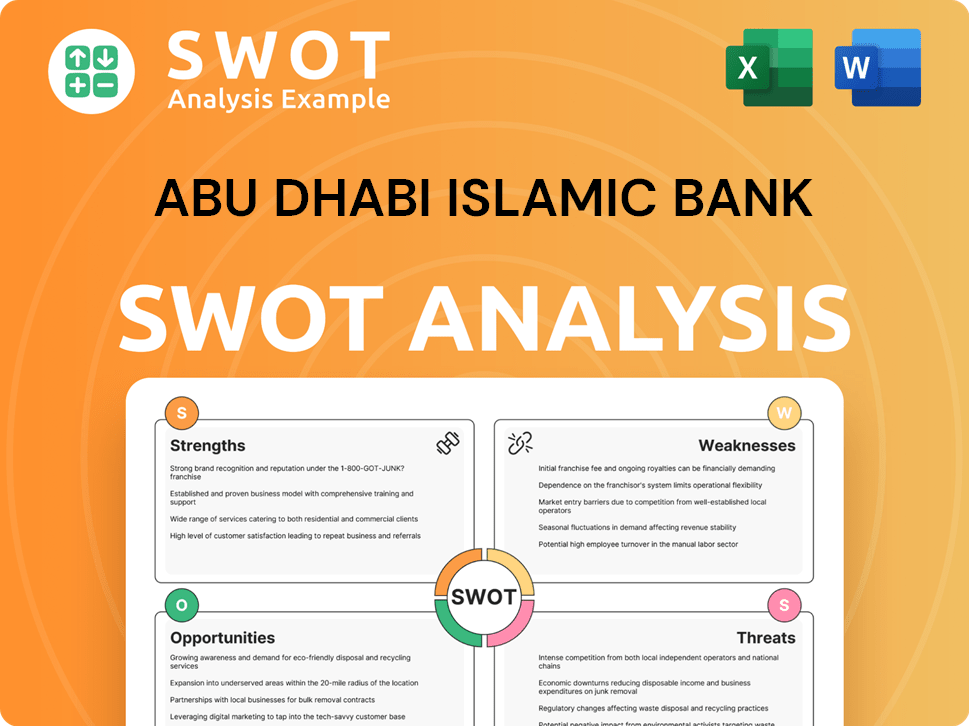
Who Are the Main Competitors Challenging Abu Dhabi Islamic Bank?
The ADIB competitive landscape is shaped by a diverse group of financial institutions vying for market share within the Islamic banking sector in the UAE. This competition is driven by innovation, digital transformation, and the ability to attract and retain customers. The bank's performance is closely watched by investors and analysts seeking to understand its position and growth potential within the dynamic financial market.
Understanding the ADIB competitors is crucial for assessing its strategic positioning and future prospects. The bank must continually adapt to the evolving demands of customers and the competitive pressures from both established Islamic banks and conventional banks offering Sharia-compliant products. This includes leveraging technological advancements and expanding its service offerings to maintain and enhance its market position.
Abu Dhabi Islamic Bank (ADIB) operates within a competitive landscape dominated by both established Islamic banks and conventional banks offering Sharia-compliant products in the UAE. Its most significant direct competitors in the Islamic banking sector include Dubai Islamic Bank (DIB) and Emirates Islamic Bank.
DIB, established in 1975, is the largest Islamic bank in the UAE with a global reach. It offers a wide array of savings accounts and financing options such as Home Finance (Murabaha) and Auto Finance (Ijarah).
Emirates Islamic Bank, a subsidiary of Emirates NBD, is known for its digital innovation and competitive products. It was the first Islamic bank in the UAE to launch a Shariah-compliant digital wealth offering.
SIB, established in 1975, focuses on community and offers affordable housing finance and Wakala investments.
Mashreq Al Islami caters to expats with specialized home finance solutions and has explored NFT-based Islamic investment certificates.
Wio Islamic, a digital-only bank launched in 2023, offers app-based Islamic banking and peer-to-peer Islamic crowdfunding.
Conventional banks with Islamic windows or Sharia-compliant products also compete for a share of the growing Islamic finance market.
The competitive dynamics within the Islamic banking in UAE are influenced by various factors, including digital transformation and the ability to attract new customers. For instance, ADIB gained approximately 216,000 new customers in 2024. The banking sector analysis also includes mergers and alliances, such as Kuwait Finance House's acquisition of Ahli United Bank, which reshape the competitive landscape by creating larger entities. To learn more about ADIB's strategic approach, consider reading about the Growth Strategy of Abu Dhabi Islamic Bank.
Abu Dhabi Islamic Bank PESTLE Analysis
- Covers All 6 PESTLE Categories
- No Research Needed – Save Hours of Work
- Built by Experts, Trusted by Consultants
- Instant Download, Ready to Use
- 100% Editable, Fully Customizable
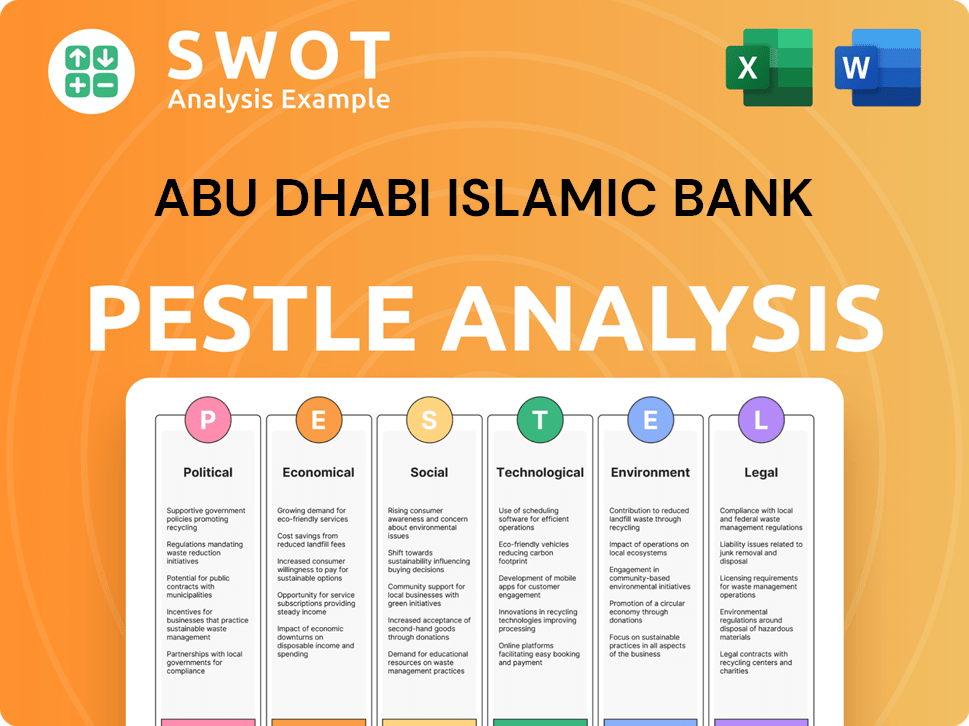
What Gives Abu Dhabi Islamic Bank a Competitive Edge Over Its Rivals?
The ADIB competitive landscape is shaped by its distinctive approach to Islamic banking, its commitment to digital transformation, and its strong financial performance. These factors allow it to stand out in the financial institutions Abu Dhabi market. Understanding ADIB's strengths and how it differentiates itself from ADIB competitors is essential for investors, analysts, and anyone interested in the banking sector analysis.
ADIB has consistently demonstrated its ability to adapt and innovate, especially in the realm of digital banking. Recent initiatives and impressive financial results highlight its strategic moves and competitive edge. The bank's focus on customer-centric services and sustainable practices further enhances its position in the market, making it a key player in the Islamic banking in UAE.
ADIB's core strength lies in its adherence to Sharia principles, offering a unique value proposition for customers seeking ethical and faith-based banking. This commitment fosters strong customer loyalty, extending across its diverse product portfolio, from accounts and financing to investments and wealth management. This focus on Sharia compliance is a key differentiator in the ADIB competitive landscape.
ADIB has embraced advanced technologies, launching initiatives like ADIB Express branches. In 2024, ADIB doubled its digital account openings to 160,000, with 85%-90% of new accounts opened digitally. It booked AED 8 billion in digital financing, enabled by an AI-driven credit decisioning engine. The mobile platform supports over 100 digital service functions. Recent innovations include near-instant mortgage approvals and cardless ATM withdrawals.
ADIB achieved a record net profit before tax of AED 6.9 billion in 2024, a 26% increase year-on-year, and an RoE of 28%. Total assets reached AED 226 billion in 2024, growing by 17%. ADIB attracted approximately 216,000 new customers in 2024, further solidifying its customer base. These figures underscore ADIB's strong market position within the financial institutions Abu Dhabi sector.
ADIB's commitment to sustainability and ethical finance, including its green sukuk program and focus on ESG principles, sets it apart. The bank was named the World's Best Islamic Bank for ESG in 2025 by Global Finance. This commitment aligns with the growing demand for Sharia-compliant and ethically aligned financial products, enhancing its ADIB competitive landscape.
ADIB's competitive advantages are multifaceted, encompassing its adherence to Sharia principles, digital innovation, robust financial performance, and commitment to sustainability. These elements collectively position ADIB as a strong player in the Islamic banking in UAE market. For more detailed insights into ADIB's performance, you can explore a comprehensive analysis of the company's financial strategies.
ADIB's competitive advantages are sustainable due to continuous investment in technology, strong regulatory compliance, and the growing demand for Sharia-compliant products. These advantages contribute to its strong market position and ability to attract and retain customers. This makes ADIB a significant player in the Abu Dhabi Islamic Bank landscape.
- Sharia-compliant financial solutions.
- Digital innovation and advanced technology adoption.
- Strong financial performance and market position.
- Commitment to sustainability and ethical finance.
Abu Dhabi Islamic Bank Business Model Canvas
- Complete 9-Block Business Model Canvas
- Effortlessly Communicate Your Business Strategy
- Investor-Ready BMC Format
- 100% Editable and Customizable
- Clear and Structured Layout
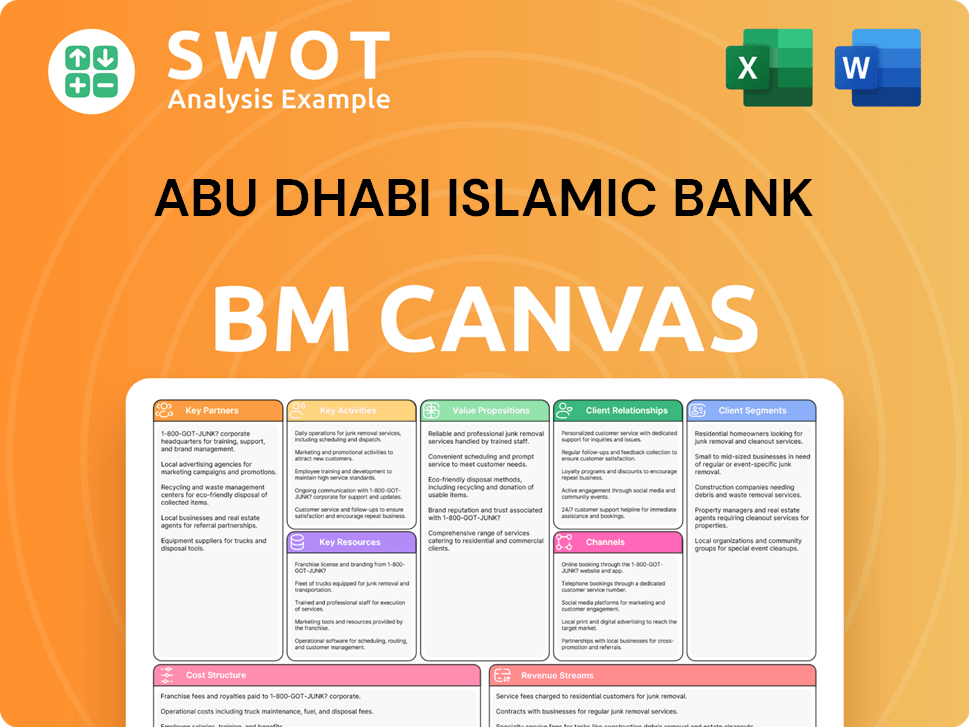
What Industry Trends Are Reshaping Abu Dhabi Islamic Bank’s Competitive Landscape?
The ADIB competitive landscape is shaped by the dynamic shifts within the Islamic finance sector and the broader financial services industry in the UAE. ADIB navigates this environment by focusing on technological advancements, sustainable finance, and strategic partnerships to maintain its market position. The bank faces challenges such as regulatory complexities and competition from conventional banks offering Sharia-compliant products.
The Abu Dhabi Islamic Bank faces a future marked by both challenges and opportunities. The bank's ability to adapt to technological advancements, capitalize on the growing demand for sustainable finance, and navigate regulatory complexities will be critical for its continued success. Strategic initiatives and partnerships will be key to maintaining and enhancing its competitive edge in the Islamic banking market in Abu Dhabi and beyond.
The Islamic finance industry is experiencing significant growth, with global assets reaching US$3.3 trillion by the end of 2023, an 8% year-on-year increase. Digital transformation, including AI and blockchain, is reshaping operations and customer experiences. The emphasis on ESG principles and sustainable finance is also a key trend, providing opportunities for growth. The anticipated interest rate cuts by the US Federal Reserve by the end of 2025 are expected to enhance market liquidity and promote increased Sukuk issuance.
Continued innovation in product offerings is essential to meet evolving consumer expectations. Regulatory complexities and the lack of a unified global regulatory framework present challenges. Cybersecurity risks and talent gaps in professionals with expertise in both Islamic finance and modern financial technology are also significant hurdles. Competition from conventional banks offering Sharia-compliant products remains a factor. The ADIB competitive landscape will be impacted by these challenges.
The strong performance of the UAE's non-oil economy drives growth in the Islamic finance sector. Rising demand for financial inclusion and sustainable financing provides significant opportunities. Strategic partnerships, such as with DIFC Innovation Hub and MoIAT, support FinTech development and industrial growth. ADIB's focus on new market segments and product innovation is crucial. Furthermore, the Abu Dhabi Islamic Bank can leverage the growing demand for Islamic banking in UAE.
ADIB's 2035 Vision emphasizes technological advancements, including Generative AI, to stay at the forefront. The bank's green sukuk program and recognition as the Best Islamic Bank globally for ESG in 2025 highlight its commitment to sustainability. Strategic partnerships and expansion into new markets are key. For more insights, explore the Marketing Strategy of Abu Dhabi Islamic Bank.
Several factors are critical for ADIB's success in the evolving ADIB competitive landscape. Adapting to digital transformation, including leveraging AI and blockchain, is essential. Focusing on ESG principles and sustainable finance will attract investors. Strategic partnerships and innovation in product offerings will also be vital.
- Embracing FinTech and digital solutions.
- Prioritizing ESG and sustainable finance initiatives.
- Expanding into new markets and segments.
- Developing innovative Sharia-compliant products.
Abu Dhabi Islamic Bank Porter's Five Forces Analysis
- Covers All 5 Competitive Forces in Detail
- Structured for Consultants, Students, and Founders
- 100% Editable in Microsoft Word & Excel
- Instant Digital Download – Use Immediately
- Compatible with Mac & PC – Fully Unlocked
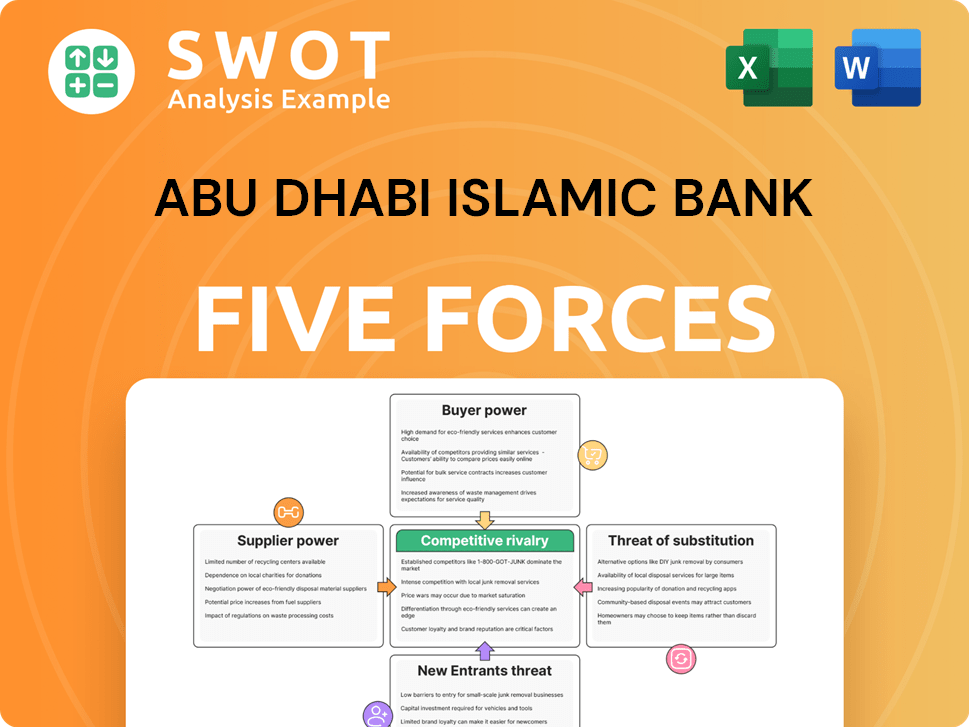
Related Blogs
- What are Mission Vision & Core Values of Abu Dhabi Islamic Bank Company?
- What is Growth Strategy and Future Prospects of Abu Dhabi Islamic Bank Company?
- How Does Abu Dhabi Islamic Bank Company Work?
- What is Sales and Marketing Strategy of Abu Dhabi Islamic Bank Company?
- What is Brief History of Abu Dhabi Islamic Bank Company?
- Who Owns Abu Dhabi Islamic Bank Company?
- What is Customer Demographics and Target Market of Abu Dhabi Islamic Bank Company?
Disclaimer
All information, articles, and product details provided on this website are for general informational and educational purposes only. We do not claim any ownership over, nor do we intend to infringe upon, any trademarks, copyrights, logos, brand names, or other intellectual property mentioned or depicted on this site. Such intellectual property remains the property of its respective owners, and any references here are made solely for identification or informational purposes, without implying any affiliation, endorsement, or partnership.
We make no representations or warranties, express or implied, regarding the accuracy, completeness, or suitability of any content or products presented. Nothing on this website should be construed as legal, tax, investment, financial, medical, or other professional advice. In addition, no part of this site—including articles or product references—constitutes a solicitation, recommendation, endorsement, advertisement, or offer to buy or sell any securities, franchises, or other financial instruments, particularly in jurisdictions where such activity would be unlawful.
All content is of a general nature and may not address the specific circumstances of any individual or entity. It is not a substitute for professional advice or services. Any actions you take based on the information provided here are strictly at your own risk. You accept full responsibility for any decisions or outcomes arising from your use of this website and agree to release us from any liability in connection with your use of, or reliance upon, the content or products found herein.